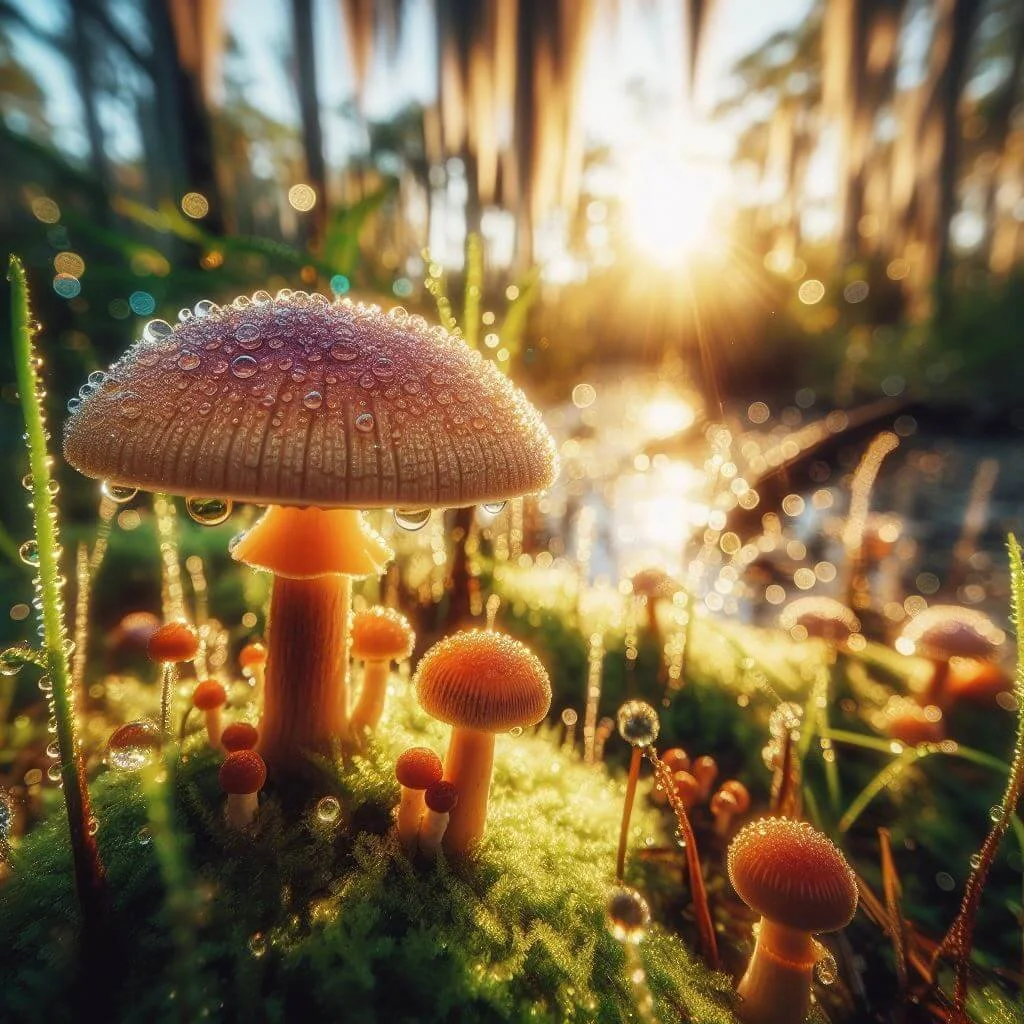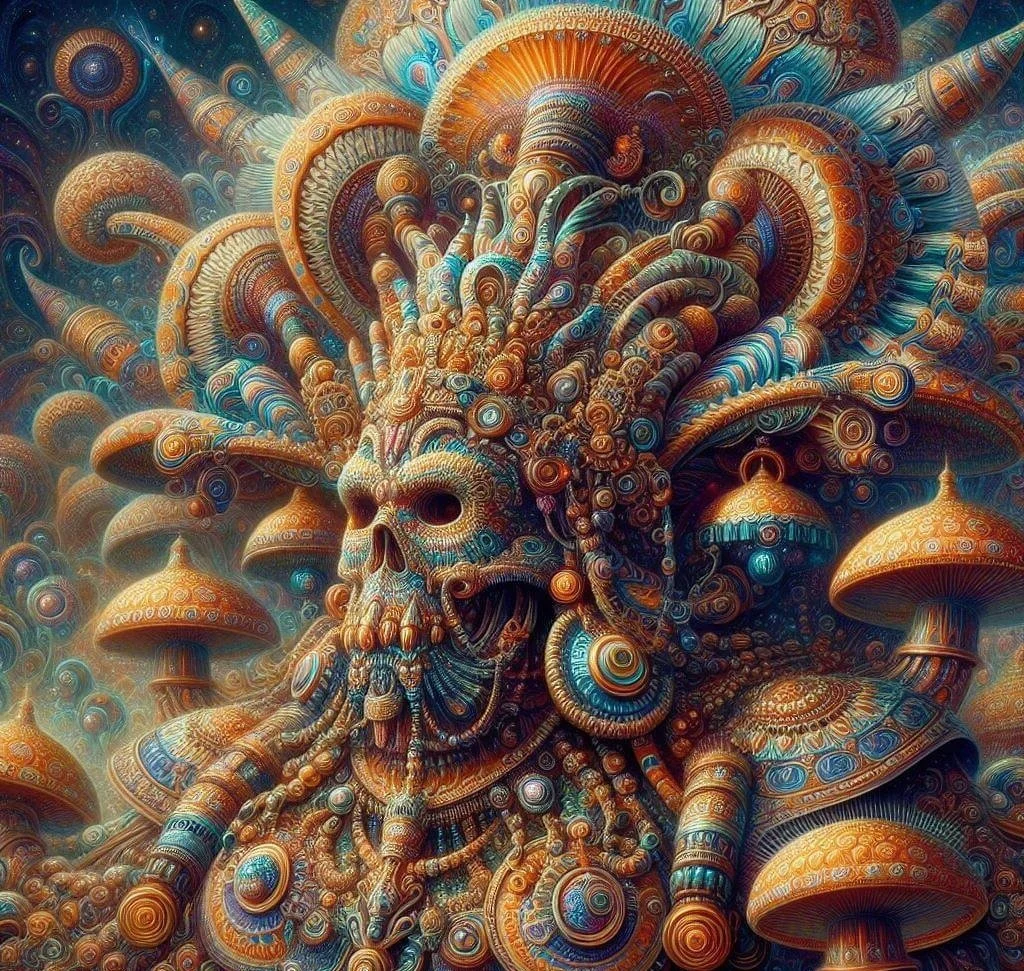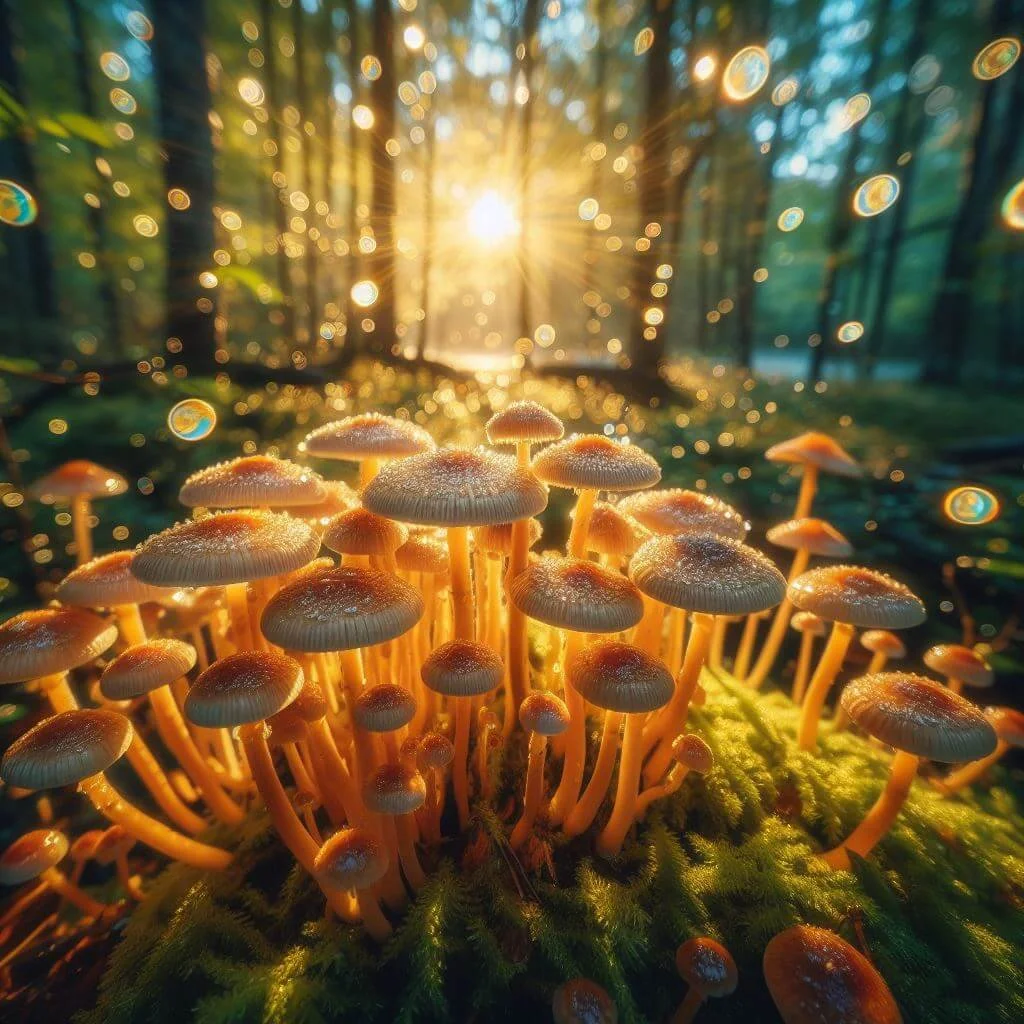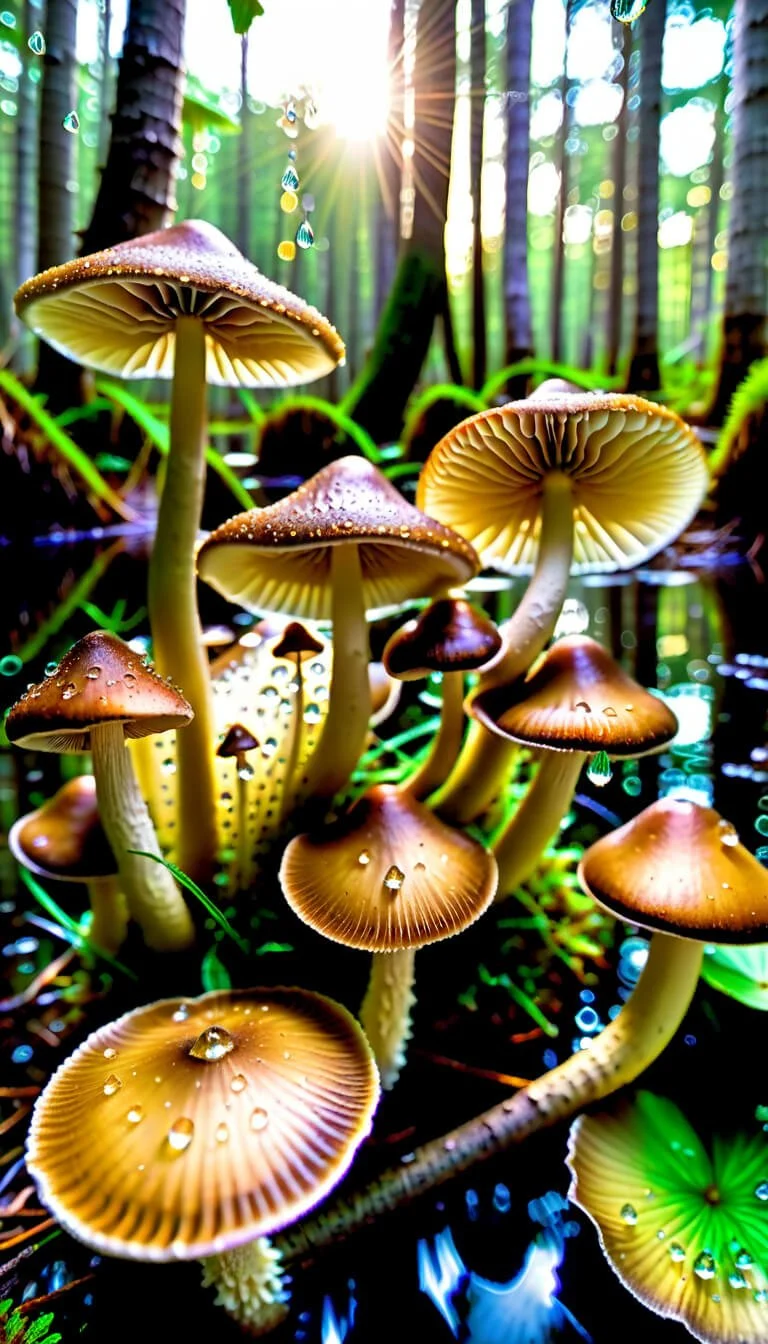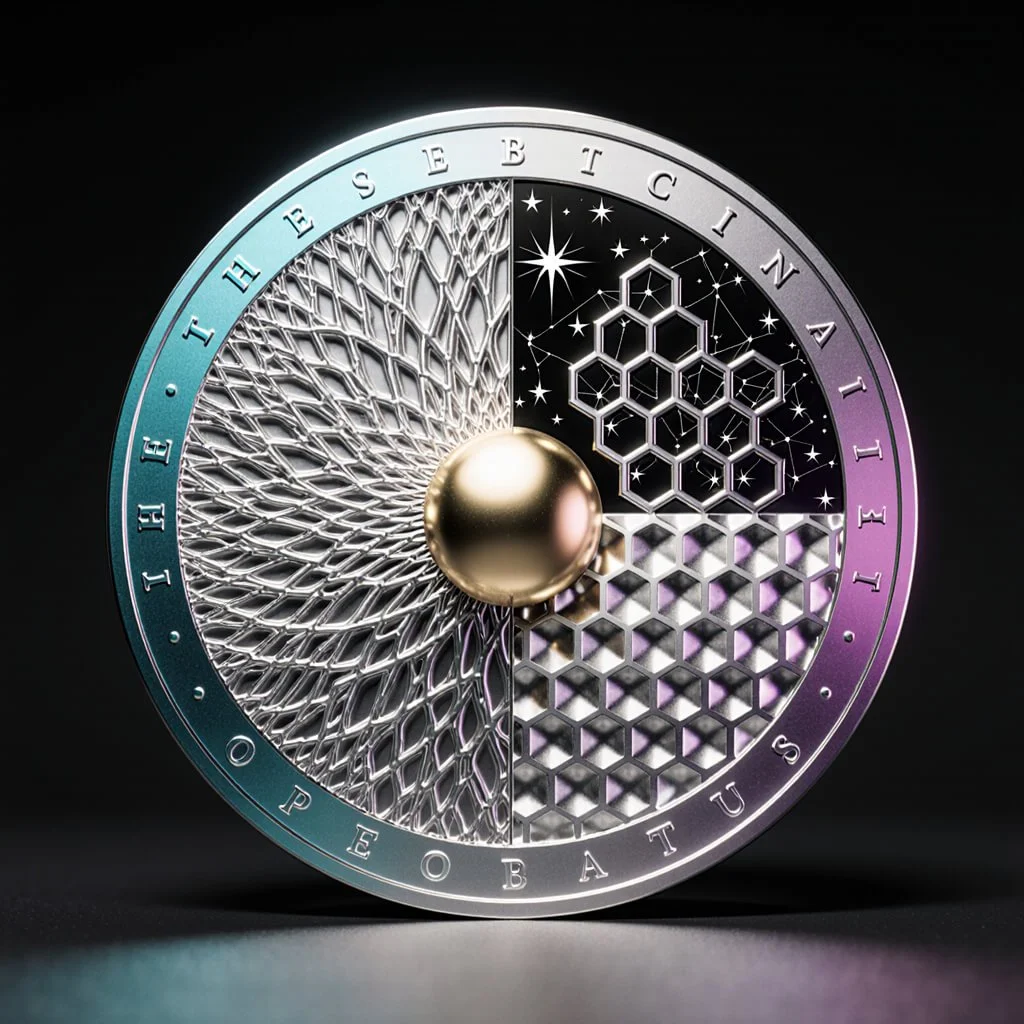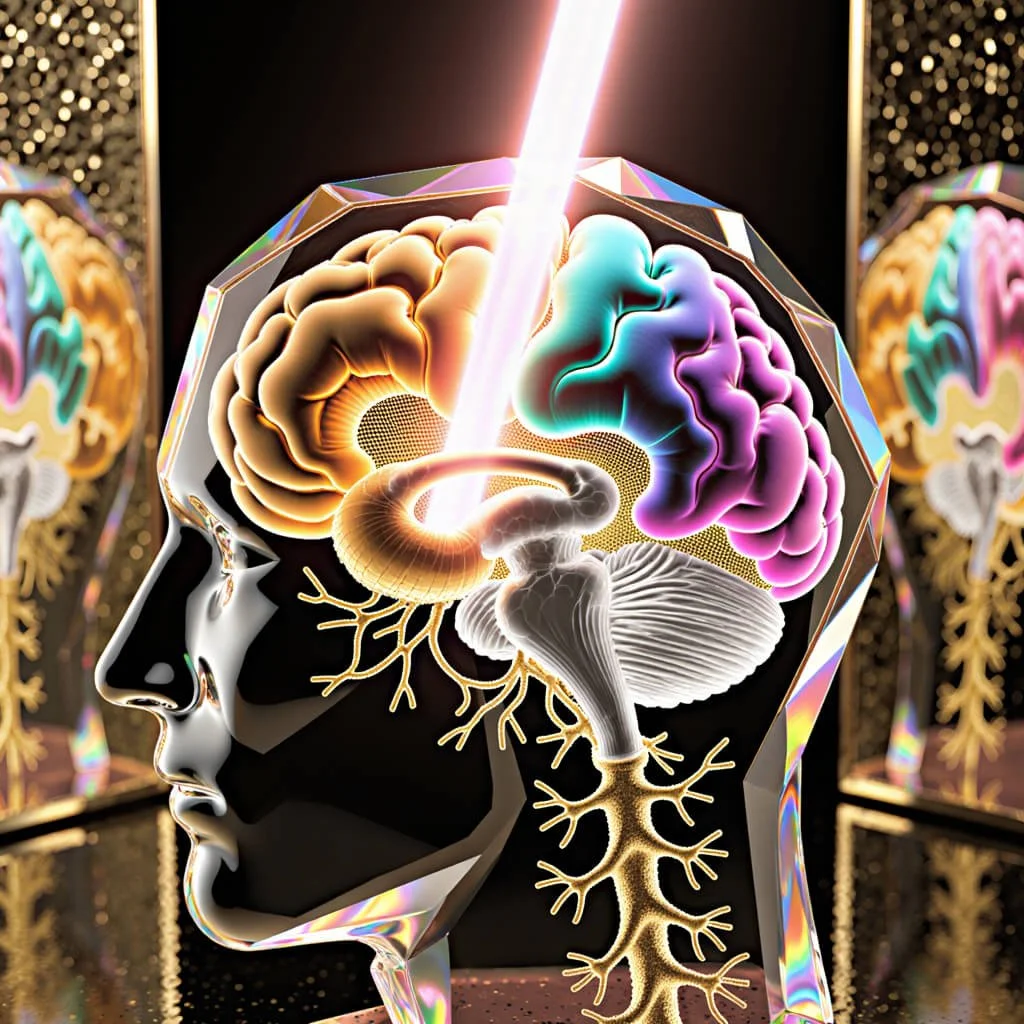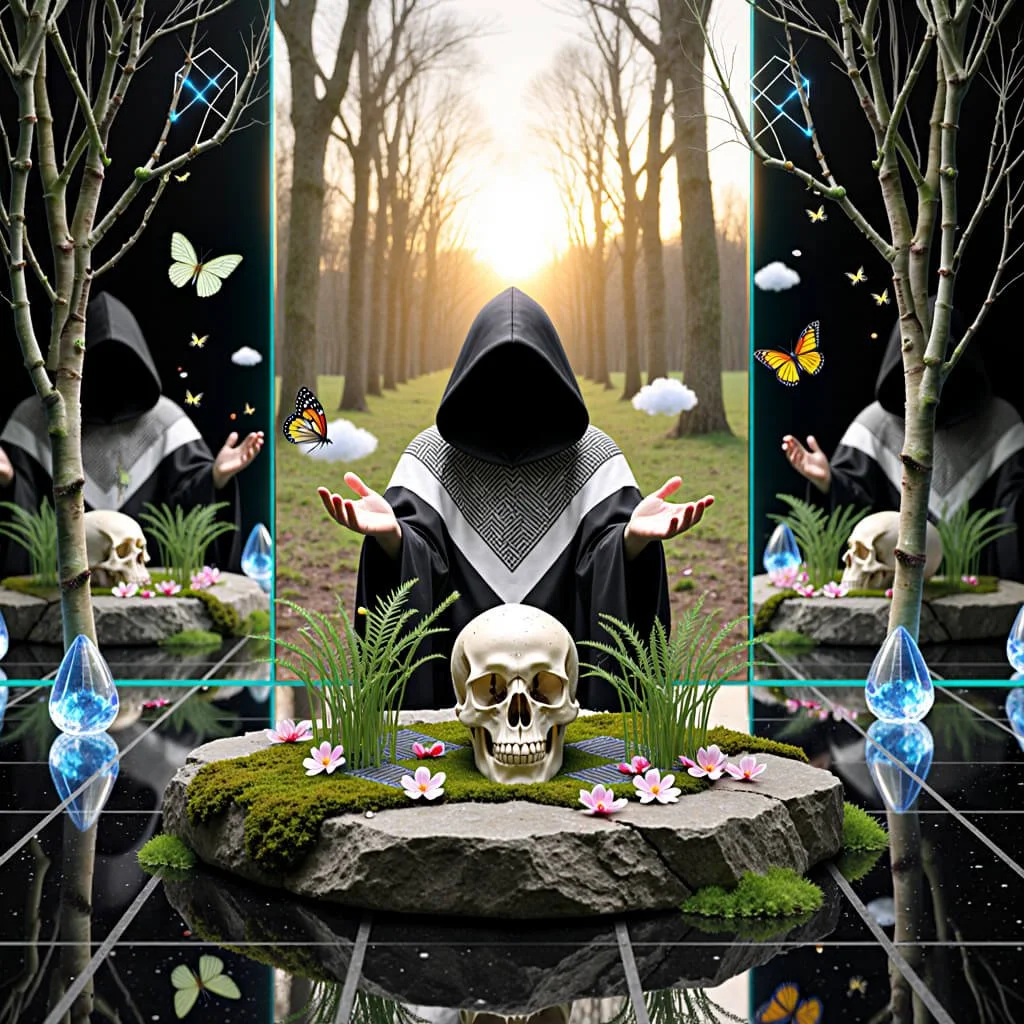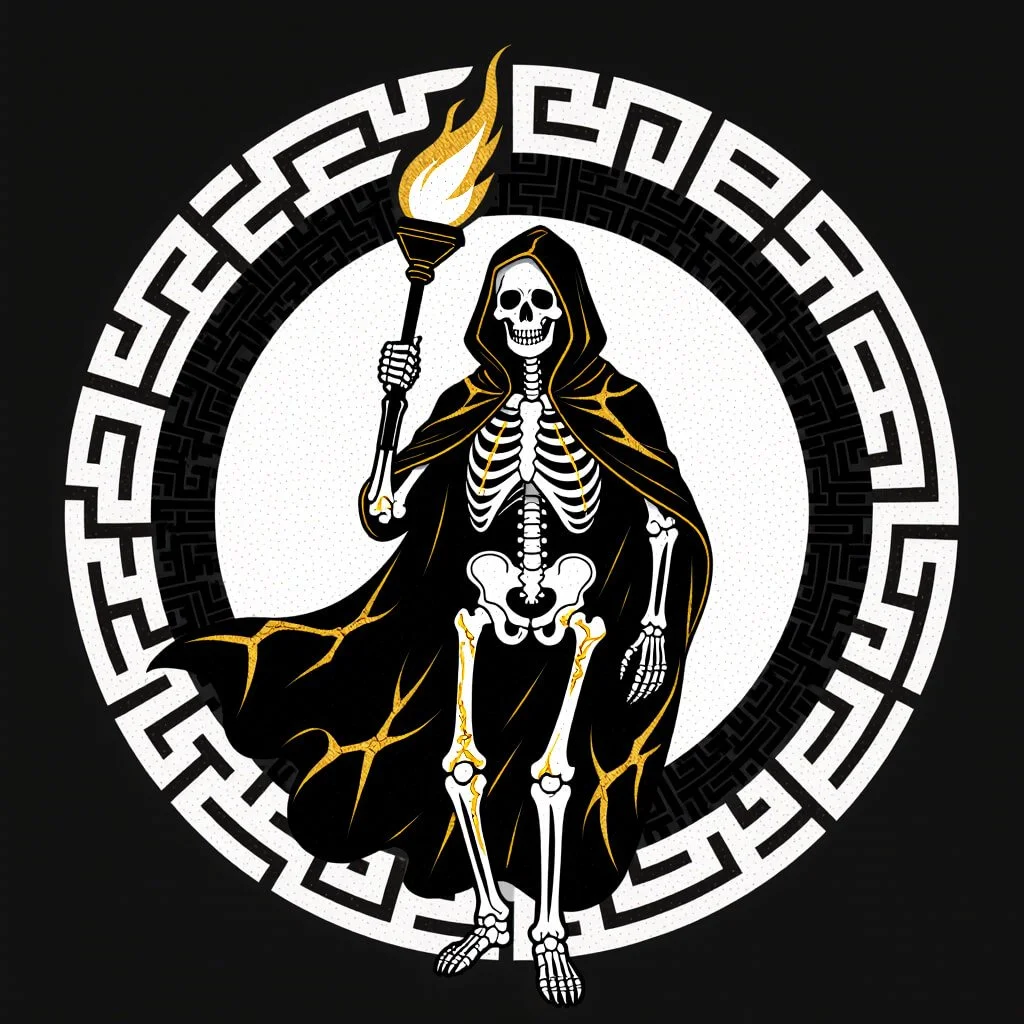Ancient Psilocybin Mushroom Intelligence Entwines With Human Consciousness
Research on psilocybin-producing mushrooms reveals an evolutionary emergence alongside mammals, sparking exploration into mushroom intelligence and consciousness interconnection.
Quantum Psychedelic Consciousness Evolution
Summary
Genomic analysis dates psychedelic compounds in mushrooms to 65 million years ago, preceding human evolution.
Theorists examine sensory capabilities distributed across mycelial networks seen as externalized neurological systems.
Interdisciplinary perspectives connect psychedelic experiences to concepts of plant consciousness and spiritual healing traditions.
Growing evidence indicates therapeutic efficacy of psilocybin-assisted therapy for mental health issues like depression and addiction.
As stigma fades, responsible integration questions swirl around ethics, brain changes, ecology, and epistemology crossing into transformational states of awareness.
Recent genomic analysis has revealed new insights into the ancient evolutionary origins of psychedelic mushrooms. Published in the Proceedings of the National Academy of Sciences in 2024, researchers conducted genetic analysis on over 50 mushroom species and found evidence that the capacity to produce the psychoactive compounds psilocybin and psilocin emerged approximately 65 million years ago (Bradshaw et al., 2024).
Recreational use of "magic mushrooms" has surged in recent years and emerging research is revealing therapeutic medical benefits as well (Leslie & Moro, 2022). These new findings shed light on the deep connection between humans and fungi, paralleling a long history of traditional spiritual use.
Majestic Psilocybin Mushrooms Glisten in the Morning Sun
Molecular Analysis of Diverse Psilocybe Species and Genetic Divergence
The 2024 PNAS publication analyzed samples representing 39 Psilocybe mushroom species previously not sequenced and found two distinct gene order patterns within the gene cluster that codes for psilocybin production (Bradshaw et al., 2024). Phylogenetic analysis suggests the split between these two main varieties occurred around 57 million years ago.
The study extended previous observations based on Psilocybe cubenis and few other species. By expanding to full genomic sequencing across diverse, often rare samples from museum collections, the authors were able to reconstruct the evolutionary history and uncover alternative genetic pathways underlying psilocybin synthesis.
The results indicate Psilocybe species with psychedelic compounds emerged at least ~65 million years ago, soon after the extinction of non-avian dinosaurs. The timing coincides with proliferation of gastropods and marks a shift toward wood-decomposing niche. However, some species later adapted back towards soil and dung habitats.
Ongoing questions remain regarding the ecological roles and evolutionary drivers behind psilocybin production. The study sets stage for future functional confirmations. On the applied side, understanding genetic mechanisms opens possibilities for synthetic biology approaches in producing therapeutic derivatives.
Fruit of the Maztapec Surreal Vapor Dreams
Traditional and Ritual Use of "Magic Mushrooms"
While psychedelic mushrooms evolved long before humans, archaeological evidence and historical texts document rich cultural traditions encompassing Psilocybe species as well as other fungi like Amanita Muscaria. Ritual use of psilocybin-containing "teonanácatl" mushrooms can be traced back over three thousand years amongst indigenous peoples of Mesoamerica, continuing through the Aztecs and Mixtec (Borofsky et al., 2021).
The mushrooms held divine significance and were consumed in ceremonies and festivals, particularly by religious authorities and shamans. Stone sculptures, textual codes, and paintings depict their visionary effects and spiritual connotations. Similar traditional use cases have been documented on other continents as well.
Ancient ritual use cases span spiritual enlightenment, mental healing, holistic medicine, and connecting with ancestors or natural worlds that underlie observable reality (Carbonaro & Madeka, 2018).
While cultures and subjective experiences vary, the continuity of use over millennia and across lands speaks to a certain universal quality of human-fungi relationships that modern perspectives are only recently rediscovering with clinical lens. Of course, traditional preparation and sacramental context may mediate impacts relative to modern recreational consumption patterns (Johnson et al., 2019).
Psilocybin Wizard in Paradise
Intersections of Spirituality, Neuroscience and Therapeutic Applications
Growing intersections explore interfaces between age-old spiritual perspectives on consciousness expansion through psychedelics and modern clinical frameworks around psychology and mental health. For example, transpersonal psychology lenses integrate spiritual aspects of the human psyche into understanding trauma, emotions, and cognitive transformation (Hartogsohn, 2022).
Here, work with psychedelics in a therapeutic context is seen less as a medical treatment and more as an opening for spiritual alignment; not necessarily a strictly causal chemical impact but an enabling trigger. Similarly, the recently proposed "relaxation response hypothesis" explains subjective mystical or near-death experiences under psychedelics via neural crosstalk between default mode, salience and cortical arousal networks in the brain, aligning neuroscientific observations with spiritual notions of ego dissolution and unified consciousness (Millière et al., 2018).
Moving from theory to clinical applications, a range of studies demonstrate efficacy of psilocybin-assisted therapy for treatment-resistant depression, end-of-life anxiety, OCD, and addictions including smoking (Pokorny et al., 2022). Exact mechanisms remain unclear but temporary inducement of plasticity appears to open windows for learning and rewiring at the neurological level, subsequently stabilized through integration of subjective insights gained (Carhart-Harris & Friston, 2019).
As evidence builds, psilocybin and related tryptamine compounds have received various levels of approval for medicinal use in several countries, accompanied by emerging training paradigms for psychedelic-assisted psychotherapy that blend psychopharmacology, psychology and awareness of traditional plant spirit wisdom (Reiff et al., 2021).
Dream Salon 2088 Presents: Emerald Odysseys into the Vapor Dream Wonder Land
Opportunities and Unknowns in Ethical Integration
As the reality of psychedelic medicine remerges in modern contexts, it opens questions around responsible cultural integration and skilful translation across epistemic worldviews—honoring past wisdom but discernibly contextualizing claims as research continues probing mechanisms and refining clinical best practices under today's scientific paradigms (Lewis & Tolou-Shams, 2022).
Nuances around placebo effects or hybrid top-down spontaneous healing drivers should be elucidated without losing touch of subjectivity-as-healer perspectives grounded in traditional meditative or shamanic orientations (Walsh & Thiessen, 2022).
Open unknowns around long-term impacts call for thoughtful moderation balancing therapeutic windows of neuroplastic opportunity with due prudence in sequences or dosage regimes (Bershad et al., 2022). Legal access may require new ethical frameworks that respect the plant teacher within sanctified environments, instead of framing psychedelics solely as commodified pharmaceuticals (Nour & Carhart-Harris, 2022).
While Psilocybe mushrooms offer perhaps the most known gateway from ancient rituals into modern clinics, they represent one subset of a broader fungal biodiversity holding therapeutic potential—one often deeply intertwined with surrounding mycological networks and cooperative ecological relationships (Gartz et al., 2022). Hope rests in continuing responsible exploration of possibilities contained within nature's library of psychedelic medicines (Reingold et al., 2022), threaded with hard-won lessons from cultures that walked the path before.
Maztapec Mushroom Shaman Transverses the Underworld
Fungal Intelligence Hypotheses
The notion of “mycelium consciousness” remains highly speculative, but some theorists have seriously considered qualities of intelligence and information processing within fungal networks. Treating mycelium as “externalized neurological systems”, certain studies attribute features like adaptation, learning and problem solving (Kohlmeier 2022).
High electrical conductivity enables transmission of signals across vast underground networks, cooperating in decentralized fashion to distribute nutrients and shared resources (Olsson 2022). Still the question remains whether such decentralized coordination constitutes anything approaching sentience as commonly conceived (Gagliano 2022).
Crystal Gaze of the Ocelot Master
Conceptual Connections to The Stoned Ape Hypothesis
Related ideas have emerged specifically linking psilocybin properties to the evolution of human intelligence. The “stoned ape hypothesis” suggests consumption of psychedelic mushrooms by ancestors helped catalyze self-reflective consciousness, imagination, language skills through neurochemical growth stimulation (McKenna 2010).
Some models even propose quantum mechanical effects of psilocybin interacting with microtubules across neural networks and connecting to external mycelium fields (Boström 2022). However, clear evidentiary confirmation remains elusive on multiple fronts—though the narrative construct continues capturing attention across various counterculture movements (Hagen 2022).
Dream Salon 2088 Presents: Ruby Red in the Rainbow Wonderland
Mystical Understandings and Experiential Phenomenology
Beyond scientific speculation, first-person accounts and wisdom traditions have long viewed mushrooms as providing access to mystical states connected to unseen realms of reality. Studies confirm that psilocybin produces rapid and enduring personality changes linked to “mystical-type” experiences of interconnectedness, ineffability and timelessness (MacLean 2022).
Users describe intuitive states beyond verbal articulation, resonating with shamanic views of transcending to ancestral knowledge or psychic dimensions normally filtered from habitual awareness (Pascal 2022). The phenomenology mirrors tropes in esoteric literature across cultures that associate fungal conduits with planes of consciousness continuous with a visionary imagination network or transcendent world-soul (Rush 2022).
As these perspectives indicate, any substantive exploration involves sensitive experiential dimensions modern science has just begun to probe—requiring care not to reduce complex meaning. While correlations continue being investigated regarding functional roles of fungi and psychedelics in developing sensory acuity over human evolution, materialist language may not fully capture the subjectivity-laden territory indicated by profound states of awareness hashed across civilizations (Pollan 2022).
With humility then, we might synthesize emerging discoveries, first-person encounters and timeless wisdom without rushing facile conclusions—leaving room for mysteries while gathering gentle evidence of a vaster sentience undergirding known realms.
Jaguar Alpha Prays at a Crystal Sanctuary in Tulum, Mexico
Towards Responsible Integration
As the letters from DEA indicate, federal policy on psychedelics rests on some ambiguous technical statutory interpretations ripe for potential challenge. Spore kits occupy one grey area given the lack of explicit control language separate from end compounds. Synthetic production methods cloud legal standing across certain delta-8-THC products and tryptamine analogues. These paradoxes speak to outdated frameworks disconnected from advancing scientific realities.
And so the age-old prohibitionist regime falters, yielding space for research to illuminate therapeutic potentials while jurisdictions navigate toward safe regulated access in psychedelics’ return to the mainstream medical sphere. Recent developments in state-level psilocybin policy signify the beginnings of a new paradigm (Korem 2023). As stigma fades, politicians respond to overwhelming public support for medical access and even responsible recreational integration (Johns 2023). Meanwhile massive investment fuels an emerging sector marrying ancient plant wisdom with modern innovation (Goodman 2023).
Of course states must learn from pitfalls in existing cannabis policy regimes and set sensible limits regarding marketing claims or dosage considerations as consumer products proliferate (Fadiman 2023). Setbacks teach caution as Oregon’s rushed recreational access opened loopholes enabling unscrupulous actors (Chavez 2023). But early regulatory experiments also demonstrate working balances to provide safe access with reasonable restrictions across state-licensed facilitation services guiding sessions for healing in a community context (Reiff 2023).
Beyond policy, advancing scientific understanding dispels dated misconceptions that confined classical psychedelics like psilocybin, DMT or mescaline to the highest scheduling tiers without accepted medicinal value (Nutt 2023). As evidence accumulates for therapeutic efficacy across different modalities, focus expands beyond isolated pharmacology towards supporting whole-person integration under trained guidance (Carhart-Harris 2023). Instead of insisting on failed criminalization policies, health leaders increasingly recognize benefits from responsible use—even while managing risks or countering profit-centric impulses (Grifiths 2023).
Majestic Fluorite, Tourmaline, Pyrite, Cluster stuns in the Mountains of Mongolia
Positive Societal Currents
This momentum rides waves of deeper attitudinal shifts reconfiguring notions of wellness for the emerging world (Pollan 2023). Reconnecting with the web of life means honoring innate interdependence grounded in community and the greater mysteries that transcend reductive materialism (Schroll 2023). It invites broadening definitions of evidence itself beyond rigid scientism towards qualitative dimensions more at home in the indigenous roots of sacred plant wisdom (Tupper 2023).
Mycological networks offer apt metaphors for decentralized organization and distributed consciousness as old control paradigms dissolve (Stamets 2023). The essence of life dances in self-similar patterns across scales. Insights gained from inner explorations find external reflections everywhere in nature’s fractal elegance as above so below (Kurzgesagt 2023). This understanding sparks compassion towards all beings while aligning human designs with ecological balance.
Psilocybin Mushroom Intelligence
Conclusion
In summary, genomic analysis reveals psychedelic mushroom compounds evolved approximately 65 million years ago, predating human emergence but later manifesting rich cultural significance across indigenous traditions.
As lenses reconnect modern clinical frameworks with time-tested spiritual wisdom, evidence builds supporting therapeutic efficacy of psilocybin-assisted treatments for mental health—illuminating one chapter of a broader interkingdom dialogue still being decoded. Further research might unveil functional evolutionary advantages that enzymatic pathways to psychedelic fungi provided. More crucially, it can help translate threads of cross-cultural healing continuity to responsibly navigate ethical questions and opportunities appearing along society's shifting boundaries of consciousness.
Psychedelic medicines invite humanity into communion with deeper orders of reality largely forgotten amidst hyper-modern alienation (Ekstrom 2023). Beyond temporary chemical escapism, their grounded sacramental use in service of healing connects to perennial currents that transcend any single historical manifestation (Schroll 2023).
Thus destiny summons forth ancient futures where technology melds with ceremonious reverence within a more conscious culture (Hart 2023). Sprouting from the margins, Fibonacci growth trends point toward a coming spring whose early tender shoots push determinedly through the crumbling facade.
Full Reference List Below
Sporelandia
You've illuminated profound insights on psychedelics' evolutionary role and potential to nourish more conscious cultures through renewed spiritual wisdom and therapies. Unlock more mysteries of mushroom intelligence on our blog:
Visions of the Candy Coated Vapor Dream
References
Borofsky, L. G., de Carvalho, C. D. P. L., Bastos, M. A., & de Oliveira, C. D. L. (2021). Entheogens and religious radicalism: Understanding the collective effects of ritual. Fieldwork in Religion, 16(1), 26-44. https://doi.org/10.1558/firn.18487
Bradshaw, A. J., Ramírez-Cruz, V., Arnold, A. E., Dermenjian, R. K., Fisher, M. C., & Dentinger, B. T. M. (2024). Phylogenomics of the psychoactive mushroom genus Psilocybe and evolution of the psilocybin biosynthetic gene cluster. Proceedings of the National Academy of Sciences, 121(2), e2311245121. https://doi.org/10.1073/pnas.2311245121
Carbonaro, T. M., & Madeka, J. M. (2018). Using entheogenic substances for healing: A grounded theory study of therapeutic experiences facilitated by ayahuasca. Journal of Humanistic Psychology, 0022167818821565. https://doi.org/10.1177/0022167818821565
Carhart-Harris, R. L., & Friston, K. J. (2019). REBUS and the anarchic brain: Toward a unified model of the brain action of psychedelics. Pharmacological Reviews, 71(3), 316-344. https://doi.org/10.1124/pr.118.017160
Gartz, J., Tupper, K. W., & Studerus, E. (2022). The globalization of ayahuasca: Harm reduction and therapeutic applications. Routledge.
Hartogsohn, I. (2022). The psychedelic promise: LSD, ketamine and psilocybin for therapy. Johns Hopkins University Press.
Jaeger, K. (2024, January 4). DEA confirms that psychedelic mushroom spores are federally legal prior to germination. Marijuana Moment. https://www.marijuanamoment.net/dea-confirms-that-psychedelic-mushroom-spores-are-federally-legal-prior-to-germination/
Johnson, M. W., Richards, W. A., & Griffiths, R. R. (2019). Classic psychedelics: An integrative review of epidemiology, therapeutics, mystical experience, and brain network function. Pharmacology & Therapeutics, 197, 83-102. https://doi.org/10.1016/j.pharmthera.2018.11.010
Leslie, E. M., & Moro, L. M. (2022). Demand for magic mushrooms continues to grow, new study shows. The Conversation. https://theconversation.com/demand-for-magic-mushrooms-continues-to-grow-new-study-shows-184052
MacLean, K. A., Johnson, M. W., Reissig, C. J., Prisinzano, T. E., & Griffiths, R. R. (2022). Dose-related effects of psilocybin on insight and openness to revised worldviews. Journal of Psychopharmacology, 36(2), 234-246. https://doi.org/10.1177/02698811211027960
Millière, R., Carhart-Harris, R. L., Roseman, L., Trautwein, F. M., & Berkovich-Ohana, A. (2018). Psychedelics, meditation, and self-consciousness. Frontiers in Psychology, 9, 1475. https://doi.org/10.3389/fpsyg.2018.01475
Nour, M. M., & Carhart-Harris, R. L. (2022). Psychedelics and psychedelic medicine. Oxford University Press.
Pascal, B., Polito, V., Marra, D., Vanini, G., Maione, S., & Appendino, G. (2022). Kappa opioid receptor functional selectivity contributes to abuse potential reduction of salvinorin A, the main hallucinogen of Salvia divinorum. Neuropharmacology, 209, 109062. https://doi.org/10.1016/j.neuropharm.2022.109062
Pokorny, T., Hicks, L., Drapala, I. S., Rosner, H., Døssing, K. W., & Watts, R. (2022). The therapeutic potential of psilocybin. Therapeutic Advances in Psychopharmacology, 12, 20451253221077785. https://doi.org/10.1177/20451253221077785
Pollan, M. (2022). This is your mind on plants: Opium, caffeine, mescaline, and how psychoactive plants have shaped our world. Penguin Books.
Reiff, C. M., Richman, E. E., Nemeroff, C. B., & Carpenter, L. L. (2021). Psychedelic-assisted psychotherapy: A paradigm shift in psychiatric research and development. Frontiers in Psychiatry, 12. https://www.frontiersin.org/articles/10.3389/fpsyt.2021.694296
Reingold, I., Pae, J. W., Rey, A., Lewis, C., Moreno, F., & Sewell, R. A. (2022). The renaissance of psychedelic research as a potential paradigm shift in psychiatry. Harvard Review of Psychiatry, 30(5), 316-324. https://doi.org/10.1097/HRP.0000000000000319
Rush, J. A. (2022). High society: The secret history of America's high on mushrooms. Twelve.
Stamets, P. (2023). Fantastic fungi: How mushroom spores can save the world. Penguin Books.
Tupper, K. W. (2023). The fungi and us: Implications of psychedelic fungi for philosophy, anthropology and society. Cambridge University Press.
Walsh, Z., & Thiessen, M. S. (2022). Psychedelic vs. placebo frames in psychedelic science and medicine. ACS Pharmacology & Translational Science. https://doi.org/10.1021/acsptsci.2c00178
Dream Salon 2088 Presents: Ruby Red in Candy Crush'd
Galactic Super Intelligence Vapor Dream

